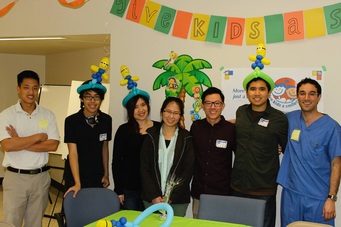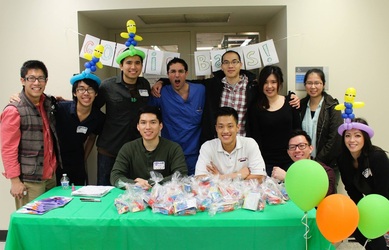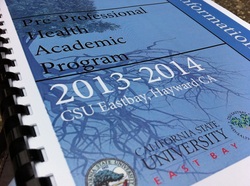Update: In documenting my shadowing experiences (at Highland Dental of Hayward), I intend to post shadow logs including the general procedures performed as well as notes detailing lessons learned. Procedures Performed:- X-Ray and Consultation
- General Cleaning and Polishing
- Scaling and Root Planing (SRP)
- Cavity Fillings
- Crown Lengthening
Notes:- SRP: In the past, this procedure was performed manually by scraping the plaque deep in the gums. Nowadays, dentists use ultrasonic scrapers which are usually faster and less irritating to patients' gums.
- Business: In order to advertise one's practice in this modern tech-savvy world, it becomes imperative for dental practices to undergo online Search Engine Optimization (SEO) for visibility.
 Update: As the first wave of midterms have come to a close, I will be posting additional entries and resources I have gathered within the past month. Entry: Allow me to preface this post by stating that Academic Excellence should always be your top priority as a postbac and student in general. That aside, playing a role in a student organization is an enriching experience and may enhance your professional school application. Consider these key points concerning student organizations: - Relevance: Do the organization's mission and goals align with your own?
- Network: How will this organization expand or strengthen your connections?
- Growth: Could this organization assist you in achieving your goals?
- Active: What role will you be able to play in the organization?
Be sure to keep your goals in mind while proactively forming a mutual relationship. As a pre-dental student, I relevantly sought out pre-dental clubs/societies. Upon partaking in organization activities, I had to opportunity to network with fellow students and professionals especially. As several in one of my chosen organizations have already gone through what I intend to undergo, I can learn from their experiences. Ultimately, you get as much as you put in.

CSUEB Students United for America's Toothfairy volunteering at UCSF Dental School's Give Kids a Smile Day 2014.
 Update: Happy New Year! As I have firmly settled back into my postbac program, I intend to update this blog once every other week by sharing my experiences and relevant resources. Should I really have shared that posting goal for this blog? Many of us have set out new goals and resolutions for this new year to better ourselves (e.g. eating healthier, exercising more, etc.). However, entrepreneur Derek Sivers relays that scientific studies show that you should keep your goals to yourself in his short TED talk. As we garner a sense of achievement from merely sharing our intentions, "telling someone your goal makes them less likely to happen." If so, what then are our options? Sivirs proposes four distinct solutions: - Resist the temptation to announce your goal
- Understand that your mind mistakes the talking for the doing
- Delay the gratification that the social acknowledgement brings
- State your goal in a way that gives you no satisfaction
Although I publicly sharing my goals and aspirations (this resource blog for example), I do so through inquiry and reflection. Rather than "My goal is to achieve X," I ask others "How can I best achieve X?" This is especially important for those of you choosing a new career path in life. I myself consult with academic advisers, admission officers, and students who have already walked the path I intend on taking myself. Furthermore, reflecting upon my thoughts and experiences allows me to better evaluate my goals and aspirations. (relevant post: Getting SMARTER!) In conclusion, share your goals with those who can help you achieve them. Once you have started taking actions to achieve those goals, reflect upon them. Share your though and experiences during the process and be open for critique. Otherwise, don't start counting your chickens before they hatch!

| Qualities of a great...
(From the perspective of)
Dentists:
Dental Assistants:
Office Manager: | ...Dentist.
- Educationally Driven: Has credentials to practice yet continues to take classes to review skills, relevant literature, and latest technology to provide patients with better treatment.
- Patience: Focusing on the quality of treatment instead of trying to sloppily finish the procedure as quick as possible.
- Understanding: Able to relate to their patients as well as clearly explain procedures, oral health, and even costs.
| ...Dental Practice.
- Friendly: Showcasing a welcoming atmosphere once patients arrive and displaying proper chair-side manners.
- Synergistic: Staff work well together and educates/provides constructive criticism for one another.
- Perceptive: Staff able to gauge patient's personality and provide a positive experience without offending the patient.
|
 My post-baccalaureate (postbac) program's orientation was earlier today. Time quickly flew by as the advisers and current postbac students informed all the incoming students of what was to come. The biggest thing to take away from initial events like these is to know what your resources are to further your goals and achieve success.Before beginning to fathom academic success, I find it imperative to plan out the actual pathway to achieving your goals. I am an advocate for the SMARTER criteria for personal development and goal-planning. "SMARTER" is actually a mnemonic to remind ourselves to develop goals which are Specific, Measurable, Attainable, Relevant, and Time-bound so we could then Evaluate and Reevaluate them. I find this criteria helps me set realistic and achievable goals.So how can we apply this? Let's take my overarching goal to "get into dental school" for example. This is a very broad goal so in being more Specific and actually Attainable, we should break this down further: "go back to school," "perform well academically," "apply to dental school." These goals could even be broken down further, but you get the point. It is also important to check whether a goal is Relevant to the overarching one - "will taking a review course really help me perform well on the DAT?" Next we should determine if a goal is Time-bound (plausible within the allotted time) and Measurable (able to show progress). Lastly, we revisit and revise by Evaluating and Reevaluating our goals from time to time. I hope this was helpful, just don't forget to think SMARTER!
|





 RSS Feed
RSS Feed